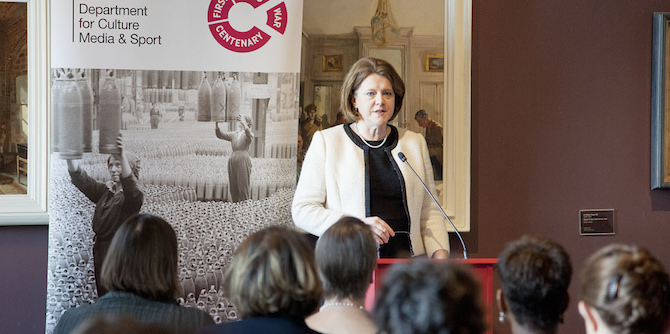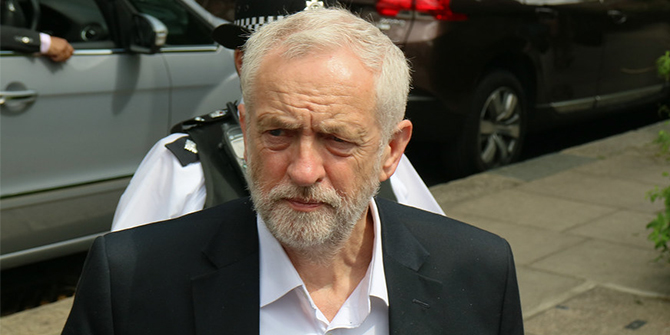 Why is the Labour party struggling to gain support? Ed Miliband certainly lacks that ‘X factor’, but perhaps it isn’t all his fault. There is a current disconnect between the public and politicians of all traditional parties, and it could also be that Labour has failed to connect because their policies are largely reactive and the public still holds the party responsible for the economic downturn, says Victoria Honeyman.
Why is the Labour party struggling to gain support? Ed Miliband certainly lacks that ‘X factor’, but perhaps it isn’t all his fault. There is a current disconnect between the public and politicians of all traditional parties, and it could also be that Labour has failed to connect because their policies are largely reactive and the public still holds the party responsible for the economic downturn, says Victoria Honeyman.
These should be halcyon days for a Labour leader. In government is a split riven coalition which, with a general election on the horizon, is turning its attention to battle divisions. Britain is still living under the harsh economic conditions brought about by an economic global crisis and a Conservative Chancellor keen to cut back and reduce the debt. The hated ‘bedroom tax’ and cuts to social services and benefit payments have hurt many, amongst them some of the most vulnerable in our society, while big companies like Amazon and Starbucks have paid derisory amounts of tax in the UK. The opposition party should be leading the way in the polls, landing blow after blow on the government and paving their way to number 10.
And that is sort of happening. Sort of. The Labour party have consistently led in the opinion polls but their lead has been narrowing and may have potentially ended. A YouGov poll for the Sun newspaper, published on 10th November 2014 put’s Labour in the lead, but by only by one point. And on November 11th an Ipsos-MORI poll gave a three point lead to the Tories. At this point in the electoral cycle, with so many issues and problems for the Con-Dem coalition, the Labour opposition should be streaking ahead in the polls. So, why is the Labour party struggling to gain support? Is it their policies? Or is it the leader?
Ed Mililband had a trickier path to the leadership that he might have wanted. His rather public fallout with his brother David, despite assertions from them both that they hold no grudges, has certainly stuck in the mind of the voting public. What might have passed by unnoticed was the fact that the majority of the Parliamentary Labour Party (PLP) did not vote for Ed, but instead voted for David. From the first moments of his victory, he was already the man the PLP didn’t want, and therefore it is no surprise that he has not been universally popular amongst them. His background as part of Gordon Brown’s inner circle might have also impacted on his popularity within the party, but is unlikely to have damaged his public image, as Brown seems to be having something of a revival on the back of his rousing appearances in the last days of the Scottish Referendum campaign.
Perhaps the issue with Ed Miliband is that he simply lacks that ‘X factor’, that certain something that makes a leader seem worthy, down to earth, personable. Before Iraq, Blair certainly had it. Those of us who lived through the 1997 General Election Campaign will remember his flawless performances. Nigel Farage has it, regardless of your attitude to his party or his policies. Many voters routinely tell journalists that Farage looks like the kind of man you could go for a pint with. I wonder how many have said the same about Ed…
But isn’t being a nice man enough? Do we really need another slick politician? Isn’t it supposed to be about substance rather than style? Well, yes it is, but being nice doesn’t win elections. Neil Kinnock is widely credited with beginning the reform of the Labour Party which led to success in 1997 under Tony Blair. His party policies were much more in line with popular thinking that those of his predecessor, Michael Foot, and he had longer as leader to establish himself than Ed. But Kinnock simply couldn’t win a general election. The image of him and Glenys falling into the sea, or the monika ‘the ginger winger’ never seemed to leave him. He lacked that ‘star quality’ and coupled with a fairly fearsome Conservative leader in Margaret Thatcher, he was never able to claim Number 10. Gordon Brown did become Prime Minister but also lacked that general election win. Another ‘nice man’ who lacked star quality.
But perhaps it isn’t all Ed’s fault. It seems that there is a current disconnect between the public and politicians of all traditional parties. In the same YouGov poll mentioned above, 24 per cent claimed they were apathetic, a large percentage of the population, borne out by turnout figures in general elections. Perhaps the Labour party is paying the price for this more keenly than the Conservative party because they have failed to appeal to their traditional grass roots voters. Their policies are largely reactive, focusing on what the government are doing wrong rather than what they would do right. They have also failed to put to bed the view that the previous Labour government was at least partially responsible for the economic crisis in Britain.
So can Ed survive? Of course, but only because we are too close to a general election for the Labour Party to willingly change leaders. People tend not to vote for divided parties. The real problem for Ed Miliband is trying to keep his party together in the run up to the election. His job depends on it.
Note: This article gives the views of the author, and not the position of the British Politics and Policy blog, nor of the London School of Economics. Please read our comments policy before posting. Featured image credit: Financial Times CC BY 2.0
 Victoria Honeyman is Lecturer in British Politics at the School of Politics and International Studies at the University of Leeds.
Victoria Honeyman is Lecturer in British Politics at the School of Politics and International Studies at the University of Leeds.








If Leadership is about harnessing ideas, skills and a vision towards achieving policy goals, Miliband has to take responsibility for this lack of connection with the public… and the current status of the Labour Party. However, a ‘Team’ is an inclusive term used to ensure a collective approach to achieving practical outcomes. Thus, we have to question whether either of these fundamental elements are enforced effectively – though, many may say that ratings and perceptions have been key factors of measurement to answer such questions.
With so much political and banking failings towards viable small businesses- post recession – business owners.. and those who also lost their homes as a direct result of such failings, the Work Programme not working and the failure of politicians to harness the ASPIRATION Nation ethics that can Re-Inspire people, one has to also ask how is it that Labour party leadership seemingly remains Disconnected from such people who seek GOOD leadership to both understand them and harness their skills? Miliband, why the silence?